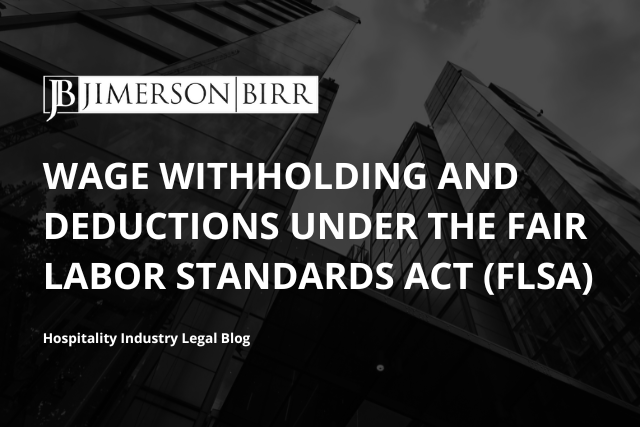Employers are permitted to withhold or otherwise deduct from employee paychecks for tax purposes, and lesser known reasons like repayment of amounts owed to the employer—in certain circumstances. Any withholding must be in compliance with contracts between the employer and employee and applicable employment regulations. The Fair Labor Standards Act (FLSA) is one such employment regulation, which establishes minimum wage, overtime pay, and recordkeeping standards in the United States. Wage deductions are a critical component of FLSA compliance. This blog post provides an overview of the key principles derived from case law and regulations on wage deductions under the FLSA.
-
The “Free and Clear” Rule for Wages
Under the FLSA, employees must receive their wages “free and clear,” meaning they cannot be subject to deductions that reduce the employee’s effective wage below the minimum wage unless expressly allowed by law. According to 29 CFR § 531.35, this rule prevents “kickbacks” to the employer, where employees return part of their wages for the employer’s benefit.
-
Exceptions to the “Free and Clear” Rule
While the general principle is that wages must be fully paid without deductions, there are exceptions where certain deductions may be permissible:
Statutory Exceptions:
- Board, Lodging, or Other Facilities: Employers can deduct the reasonable cost of board, lodging, or other facilities if these are customarily provided to employees (29 U.S.C. § 203(m)).
Judicially Recognized Exceptions:
- Repayment of Advances: Employers can deduct amounts to recover free and clear advances made to employees. This was upheld in Brennan v. Veterans Cleaning Service and is seen as equivalent to a loan.
- Third-Party Payments at Employee Direction: Deductions for payments made to third parties on behalf of employees (e.g., fines or fees) are generally permissible, provided the deductions do not benefit the employer and are made with the employee’s consent.
-
Prohibited Deductions
Certain deductions are outright prohibited under the FLSA if they undermine the purpose of the Act, which is to ensure employees maintain a minimum standard of living.
Examples of Prohibited Deductions:
- Employer-Creditor Relationships: If an employer seeks to recover amounts owed directly by the employee (e.g., for damaged property or shortages), deductions that reduce wages below the minimum are invalid.
- Shifting Business Costs to Employees: Costs associated with the employer’s operations (e.g., uniforms, tools) cannot be passed onto employees in a way that reduces their wages below the minimum standard.
Key Cases:
- Mayhue’s Super Liquor Stores, Inc. v. Hodgson (464 F.2d 1196): The court emphasized that even “voluntary” agreements to repay cash register shortages are invalid if they reduce wages below the statutory minimum.
- Brennan v. Veterans Cleaning Service, Inc. (482 F.2d 1362): Deductions for damages caused by the employee (e.g., destroying a company vehicle) violated the Act because they reduced the employee’s net wages below the minimum.
-
The Role of Recordkeeping
Employers bear the burden of keeping detailed records of deductions to demonstrate compliance. Failing to segregate permissible deductions from impermissible ones can lead to all deductions being deemed invalid, as highlighted in Brennan v. Veterans Cleaning Service. Employers should maintain clear documentation of:
- The purpose of each deduction.
- An accounting of advances that are being repaid by the deductions.
- Employee consent where required.
-
Waiver of FLSA Rights is Prohibited
Employees cannot waive their rights under the FLSA, either through direct agreements or implicit consent. This principle ensures that employers cannot circumvent minimum wage and overtime requirements through contractual arrangements. The courts have repeatedly emphasized that public policy underpins the FLSA, protecting employees’ fundamental rights.
-
Practical Takeaways for Employers
To comply with the FLSA’s wage deduction rules, employers should:
- Avoid deductions that would reduce an employee’s effective wage below the minimum unless covered by a statutory or judicial exception.
- Clearly document all deductions and ensure they are categorized correctly.
- Refrain from deducting for business expenses or damages caused by employees unless explicitly permitted.
- Regularly review wage and hour practices to ensure alignment with FLSA regulations.
- Consult with knowledgeable legal counsel when the need for deduction arises to ensure compliance with applicable employment regulations.
Conclusion
The FLSA’s wage deduction provisions reflect a careful balance between employer flexibility and employee protections. By adhering to these principles and maintaining rigorous documentation, employers can mitigate risks and ensure compliance with federal wage and hour laws. Contact us today!

